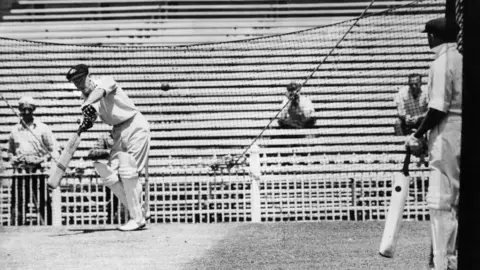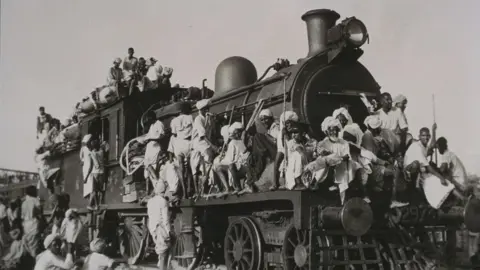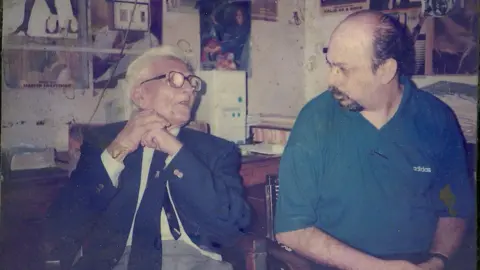
 Getty Images
Getty Images
India faced mighty Australia led by legendary Don Bradman on its first Australia tour
India's forthcoming cricket tour of Australia continues a historic rivalry that has evolved since 1947-48. This fierce competition is now as keenly awaited as the Ashes. But the inaugural tour unfolded against the harrowing backdrop of India's independence and partition, with cricketers confronting turmoil and communal strife at home, as they prepared to face Australia’s legendary Donald Bradman and his “Invincibles".
In 1947, as India prepared for its first cricket tour of Australia, the nation was in the midst of unprecedented upheaval.
Independence had come with the painful partition that created Pakistan, sparking one of history's largest and bloodiest migrations. Amidst this chaos and as millions crossed borders, religious violence spread with Hindus and Sikhs on one side, and Muslims on the other. India's 16-member cricket squad - selected months earlier - also had to deal with both personal and national turmoil as they readied themselves for a landmark series.
Anthony De Mello, the president of Board of Control for Cricket in India, announced the team with a backdrop of a map of undivided India, proclaiming that the team would represent all of India.
Until then, the Indian cricket team – known as "All India" – had only toured three times for official Test matches to England between 1932 and 1946, losing the series on every occasion.
But in 1946 future Australian captain Lindsay Hassett brought an Australian Services team to India to celebrate the Allies’ victory in World War Two. India won the unofficial series of three matches 1-0 and Hassett reported back to the Australian cricket authorities that the Indians were worthy of an official Test series.

 Getty Images
Getty Images
The partition of India sparked one of history's largest migrations
Excitement and anticipation ran high in Indian cricket circles as the team was expected to face the mighty Australians, led by legendary batsman Donald Bradman. His team was later dubbed "Bradman's Invincibles" after returning undefeated from England in 1948.
De Mello’s India squad was led by ace opening batsman Vijay Merchant, with his reliable partner Mushtaq Ali serving as deputy.
Both had been exceptional on the English tours of 1936 and 1946, cementing their leadership roles. The squad also boasted elegant batter Rusi Modi and promising debutant fast bowler Fazal Mahmood, adding a dynamic mix of experience and fresh talent.
But both Merchant and Modi withdrew from the tour on medical grounds. Ali also withdrew following the death of his elder brother, leaving him with family responsibilities.
As a result, Lala Amarnath was announced as the new captain and Vijay Hazare his deputy.
However, the violence that erupted following partition nearly prevented Amarnath from reaching Australia. According to a 2004 biography by his son Rajender Amarnath, Lala Amarnath narrowly escaped a sectarian mob in Patiala in Indian Punjab. His home in Lahore, now in Pakistan, along with its priceless artefacts, was lost forever.
He also encountered danger during a train journey to Delhi.
At a station in Indian Punjab, a police official recognised Amarnath and gave him a kada - a steel bangle worn by Sikhs and many Hindus as a religious symbol. Later, a mob at the station spared the cricketer because of the kada - it probably led them to believe he shared their faith.
On the other side of the religious divide, pace bowler Mahmood found himself facing a deadly mob on a train.
The team had scheduled two weeks of training in Pune (then Poona) from 15 August - though it was not known then, that was the day India was partitioned.

 Gulu Ezekiel
Gulu Ezekiel
Writer Gulu Ezekiel with Lala Amarnath, the captain of India team that toured Australia in 1947-48
Despite restrictions, Mahmood reached Poona for the training camp. Afterwards, he travelled to Bombay (now Mumbai) en route to Lahore. He writes in his 2003 autobiography that on the train, two men threatened him, but former Indian captain CK Nayudu intervened, bat in hand, and warned them off.
Once he reached curfew-bound Lahore, Mahmood was horrified by the bloodshed he witnessed there and decided to stay back in Pakistan and not tour Australia. He later became part of the Pakistani cricket team and made his Test debut in 1952-53 against India.
Two other members of India’s squad for the Australia tour – Gul Mohammad and Amir Elahi – also later moved to Pakistan and played against India in the 1952-53 series.
Despite these setbacks, India’s tour went ahead, though a weakened India faced Australia without four of its leading players and lost the series 4-0.
The two countries now play each other almost every two years. The miracle, however, is that the inaugural tour of 1947-48 happened at all, given the tumult at home.
Gulu Ezekiel is the author of 17 sports books, his latest being Salim Durani: The Prince of Indian Cricket, released earlier this year
Follow BBC News India on Instagram, YouTube, Twitter and Facebook

 1 month ago
9
1 month ago
9










 English (US) ·
English (US) ·